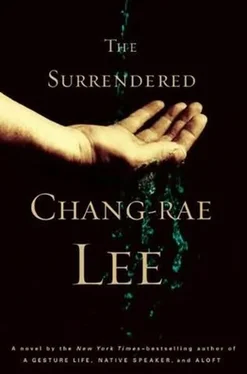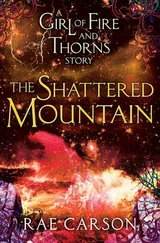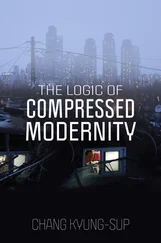The old farmer stood up with his wife by his side and said he wished he could offer something for breakfast but there was hardly anything left and so asked if they would kindly move on, now that it wasn’t raining. He also said he had heard of a newly opened UN refugee camp some twenty kilometers south. No one much believed him about the camp or his store of food, but he’d surely suffered them and people began to gather their things and leave. While her siblings yawned and rubbed the sleep from their eyes, June brushed the smudges of dirt from their clothes. It was of course futile, as they could never do any wash and their clothing and skin were long infused by the brickish color of the valley soils, but she did so anyway because it was what her mother would do if she were still alive. It was how June formulated every decision. Whether to go on and whether to rest. Where to sleep at night. Whom to approach and whom to flee. But most of all it was how she snuffed her own animal impulses, her desire to keep wholly for herself the meager cache of whatever they were lucky to find. It was how she blunted herself from ever seeing her siblings as burdens, or worse, as though they were killing her, if slowly, two blind leeches attached to her heels and drawing the life out of her. It was how she had not yet allowed herself to harden against them. To hate them. For of course she loved them, and just as her mother would she’d give up all to protect them, but what in fact was left of her to give? She felt hollowed with hunger and weariness, only the fear invigorating her blood. She was beginning to realize, too, that they could not go on in this way for much longer, that something would have to change, and soon. They were carefully listening for frogs and crickets at night, in the hope of catching some to eat. They dug for roots and grubs during the day. They begged and stole whatever they could, but three months of grinding war had left little of value. And she knew she was too young and powerless to keep them sound. She could take care of herself but someone else would have to aid them. Otherwise they would perish, or in a moment of weakness she might let them perish, as she would sometimes imagine, letting go of their hands as they waded across some fast-moving river, the sound of the rushing water only partly masking their cries.
The farmer again asked the others still in the house to leave. But some had not even begun preparing to clear out, either remaining on their haunches or lying on the floor and smoking cigarettes. The farmer began complaining, saying he’d been patient and enough was enough. But he was being ignored, those moving on continuing to do so, the others remaining indolently at rest. The blind man and his mother had tightened their bundle and he hefted it onto his back, tying a canvas strap around his chest to secure it. They were shuffling out ahead of June and she saw that they were among the few who thanked the farmer and his wife as they exited. The wife was kind-eyed and spoke softly, and when they reached her, June took her hand and asked if they could remain with them for a while, if for just a few days, explaining as quickly as she could what had happened to their family, that they were now alone in the world. They’d sleep in the outhouse, if they had to. The farmer overheard her as he was exhorting some of the others to leave and he scolded his wife for even listening.
“The whole country is orphaned!” he said. “Get on, now, children, before the day gets too late. You’ll be better off for it.”
But instead of leaving, June sat down right in front of him, tugging her siblings to sit beside her. He told them to get up.
“Please, Grandmother, let us stay,” June said to his wife, addressing her as if she were of their blood. “Don’t make us go.”
The farmer said harshly, “Did you not hear me, you insolent children!”
“Please, Grandmother!” she cried, her siblings now chiming in, too.
The farmer became enraged and grabbed her brother roughly by the arm, yanking him up like a doll. Ji-Young shrieked in pain and the farmer’s wife asked her husband to stop. But he then grabbed June the same way and tried to pull her up to her feet. She resisted and he clasped her shirt and would have almost pulled it off, had she not leaned in and bitten him hard on his bony, darkly tanned forearm. The farmer shouted an obscenity and flung her wildly behind him, sending her crashing against a neat stack of kindling near the step-down to the tiny kitchen. June lay on the floor, her back and side afire with pain. For a moment all in the house seemed suspended, everyone staring at her, before she realized that it was not her they were looking at; part of the stack had fallen away, exposing the lid of a large earthenware barrel hidden behind the kindling. The farmer’s wife immediately knelt and tried to gather the loose branches to place them again before the barrel.
Someone barked, “Hey, old-timer, why didn’t you show us that last night?”
“Yeah, let’s see what’s in the jar.”
Indeed, when his wife had prepared the pot of porridge, he’d made a special point of showing the inside of a similar vessel, which was practically empty save a cup for scooping.
“It’s none of your business!” the farmer said. “None at all. Look here, I’ve been patient with all of you! We have nothing to give anymore. Now let us have our home again!”
One of the middle-aged men who’d been smoking now stood before the farmer. His cheeks were rough, his eyes lightless and deeply set. He was a head taller than the farmer and much broader, though still thin like everyone else, and he spoke without any hint of jest in his voice: “Just show us what’s inside.”
“I won’t!” the farmer said.
The man brushed past him. But before he’d taken a second step the farmer pulled a wooden baton from under his shirt and hit him in the back of the head. The man fell straight down, as if dropped from a great height. He landed headfirst, with an ugly, hollow sound. June scooted away as some men attended to him; his face was pinched against the hard floor, dark, thick blood streaming from his nose. The farmer stood dazed as they tried to revive him, but it was no use.
“He’s killed him,” one of them said.
“With his back turned, no less!”
The farmer was already retreating against the wall when they rushed him. He held back the first man with his baton but the others quickly overwhelmed him, punching and kicking him as he crumpled to the floor. His wife was screaming for them to stop. But they beat him until he was curled up in a ball, covering his head, crying out like a pitiful boy in a schoolyard, his mouth webbed with bloodied strings of spit.
It was then that the house was ransacked. Everyone took part. Even many of those who’d begun hiking back to the main road, including the blind man and his mother, returned to force their way back inside. There was no use in doing anything else. It took perhaps all of a few minutes, for how little of value there was. First the hidden earthenware barrel was dumped, which was only half full of dried corn, then the larder of dry goods, and then the kitchen was stripped of pots and utensils and of anything else someone was willing to carry away. June and her siblings scooped up as much of the corn as they could; Ji-Young even used his mouth, jamming it with kernels when his shallow pockets were filled. (Later on he spit them up into June’s hand and she rinsed them in the next stream they crossed.) Somebody broke off the lock on the clothes chest and women were rifling through it, June lucky to grab a blanket that fell between two women as they struggled over a silk blouse. The blanket was of light weight but large, and June knew it would be useful. The rest was just old people’s clothes, worn and stained. In the end the house was in shambles, the floor a mess of pottery shards and torn fabric, smashed bits of furniture, every last object picked through and taken apart, and if not stolen, then instantly rendered worthless, and as the three of them left, June ordered her siblings to look away from the farmer’s wife, who was still kneeling over her half-conscious husband, her face pure madness, screaming as if she were slowly being murdered.
Читать дальше











